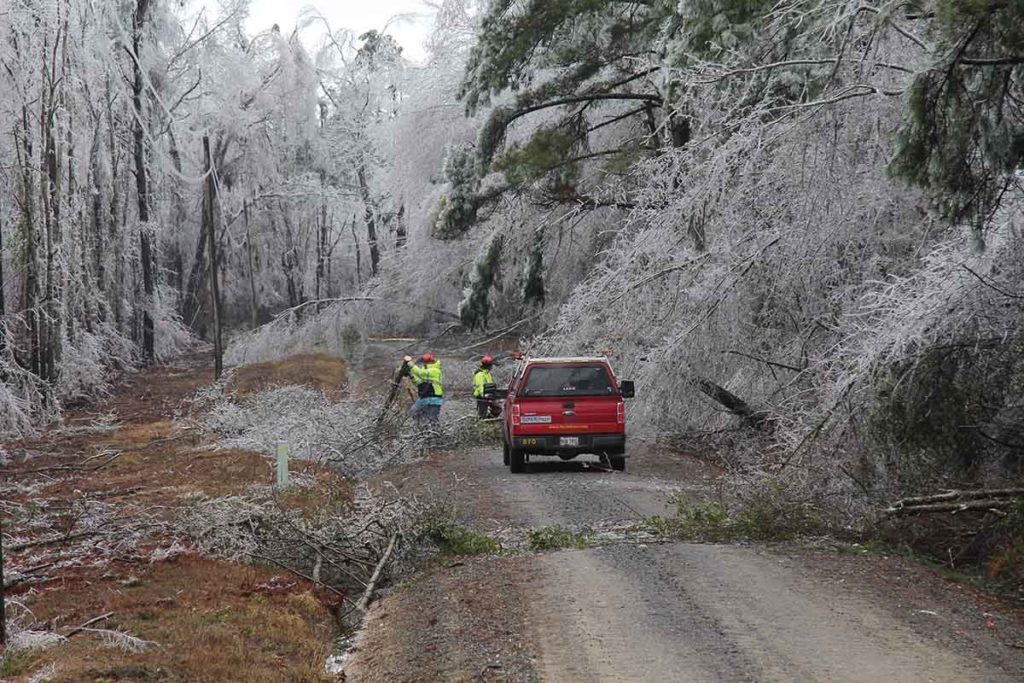
What would happen if a polar vortex plunged thousands into icy darkness in the Northeast and then, after electric cooperatives in the central U.S. sent mutual aid, a 7.7-magnitude earthquake hit along the New Madrid Fault that stretches from Illinois to Arkansas?
That’s a scenario that emergency, safety and energy coordinators from 22 electric cooperative statewide associations and their state government peers wrestled with in Fractured Freeze, the first tabletop exercise of its kind. The drill was organized by NRECA and the National Association of State Energy Officials.
NRECA CEO Jim Matheson welcomed more than 50 participants, including two U.S. Department of Energy officials, to the exercise recently in Arlington, Virginia.
“This is an excellent example of where folks can put their heads together and better prepare for the future because, let’s face it, your job is not getting any easier,” Matheson said. “At NRECA, we want to find the best way to convene everyone; to find opportunities to facilitate discussion and implementation of ideas.”
Roundtables of co-op and state officials tackled power restoration and recovery from the two make-believe disasters that created harrowing circumstances for mutual aid crews, including shortages in gasoline, accommodations and supplies along with damaged roads, bridges and other critical infrastructure.
“Dual disasters like those in Fractured Freeze may not be that far-fetched as weather and environmental conditions become more extreme,” said Martha Duggan, NRECA senior regulatory affairs director. “This exercise allowed electric co-ops to face two catastrophes in a safe place, polish their strengths and develop bonds with state officials that will be crucial when disaster strikes.”
Ben Bolton, senior energy programs administrator at the Tennessee Department of Environment and Conservation, facilitated the exercise and shared his experience from 11 natural disasters in his home state over the last two years.
“You can’t have a massive outage without it affecting rural co-ops or the state energy office. Both get involved in different ways,” he said. “We need to increase our cooperation. This is a first great step to build that bridge between rural co-ops and state energy offices.”
Co-op participants said Fractured Freeze provided significant benefits:
• New state emergency contacts.
• Opportunities to educate state officials on the co-op model.
• Relationship building with other co-op statewide associations.
• Reinforcement of the need for timely recordkeeping for reimbursement from the Federal Emergency Management Agency.
• New resources and techniques for disaster recovery.
Co-op officials said the exercise gave them a blue-sky chance to fill the void in their state connections.
“It was a good idea for NRECA to have this exercise and invite state officials,” said Rob Land, vice president for risk management and training at the Association of Missouri Electric Cooperatives. “It helps to develop a working relationship before a disaster strikes.”
Peggy Dantzler, vice president of loss control and training for the Electric Cooperatives of South Carolina, echoed the significance of the exercise in establishing these relationships. “Co-ops need a person at the county or state emergency level so communications can happen more accurately and more quickly,” she said.
Co-op leaders also were eager to share with state officials how co-ops operate and coordinate to restore service through mutual aid agreements.
“The exercise really opened up their eyes to how much territory we cover in a state,” said Joe McElroy, safety director at the Michigan Electric Cooperative Association. “They also have a much better idea on how we all work together in the real-life disasters. In that respect, the exercise was worth its weight in gold.”
Even veterans of massive natural disasters found the exercise valuable. Discussions drew new ideas to expedite recovery, like contacting park services when chainsaws are needed or the state tourism department to secure housing for crews. State and public officials also can help identify large empty parking lots for staging and tent cities.
“We exercise our storm muscle quite a bit,” said Addie Armato, CEO of the Association of Louisiana Electric Cooperatives. “When you’re in the heat of it, you’re strictly focused on your industry and your particular needs. This exercise allowed us to come together and have a better understanding of the big picture and not just tunnel vision we have when we get into recovery mode.”
Cathy Cash is a staff writer for NRECA.